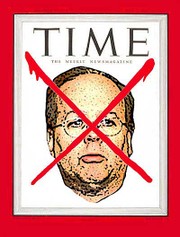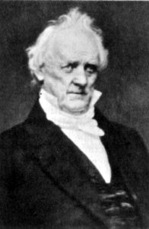When political assumptions are shiny and new, idealism abounds. As those beliefs are validated by events, they become rigid. When they are challenged beliefs can become an ideology. (Picture from BakedZiti.)
After this ideology triumphs and you enter a period of excess, the next crisis may have nothing whatsoever to do with the original political assumptions. You meet the new challenges as you met the old, it doesn’t work, and you’re left practicing short term values.
Short term values differ from pragmatism in that their justification is ideological. You’re just trying to get past the crisis, which is not the problem at hand but the next election.
This turns out to be a brief biography of Karl Rove (right). Rove started as an idealist, then became an ideologist and, at the height of his power, began practicing the short term values meant to get George W. Bush past elections, not problems.
The tragedy has been repeated time-after-time throughout American history.
- Jacksonian Democracy couldn’t deal with the collapse of its ideological assumption about how sections must be balanced. So we had James Buchanan trying to paper over the nation’s split in the 1850s.
- Lincoln’s Thesis of Union could not deal with the new urban-rural or labor-capital splits of the 1890s. So we had Grover Cleveland borrowing gold from J.P. Morgan to keep the government going.
- Theodore Roosevelt’s Progressivism couldn’t deal with the crisis of the Great Depression. So we had Herbert Hoover re-nominated by acclamation in 1932.
- Franklin Roosevelt’s New Deal Liberalism could not deal with the social breakdowns of the Vietnam Era. So we had Lyndon Johnson, and Hubert Humphrey.
- The Nixon Thesis of Conflict has no Clue about dealing with the climate crisis, the War Against Oil or the aging of America. So we have Iraq, and Katrina, along with the corruption of our system and values.
This is not to excuse those leaders who followed these assumptions to their end for their personal responsibility involving what followed. Just to explain it.
Which is what I think Democrats need to do now with Rove. Leave him behind. And the way you do that is by understanding why he did what he did, why he practiced short term values. Then practice long term values.
It was a simple lack of vision, an ideological floundering in the rising tide of a new era, which un-did Rove.
And he is undone. That’s another important point. Treating him seriously at this point is silly.
He is an historical artifact, nothing more. He has no more relevance to the future than does James Buchanan (left), or Grover Cleveland, or Herbert Hoover, or Lyndon Johnson.
Rather than paying any attention to Karl Rove, it’s past time for Democrats to focus on basic questions.
- What are our assumptions? What do we believe to be true, about government, about history, and about the future?
- What are our ideals? What do we want the world to look like in 10, 20 30 years? What are our bedrock principles?
- How does the world work? How are we to go about the
process of change? What are the power levers we will bring to bear on
what we consider the real problems?
- What are our real problems? What’s alligator wrestling and what’s the real swamp we must drain? What’s structural and what’s ornamental?
In the last crisis, during the 1960s, this work was done by a political
movement, movement conservatism, which brought us Barry Goldwater,
William F. Buckley, and Ronald Reagan. People like Rove have assumed
the world of those men to still be relevant, as have their followers,
but it isn’t any more. And now the American people know this.
Our new world is being made right now by the Netroots, and not by
anyone you see on the TeeVee. On hundreds of blogs, blogs like this
one, writers and thinkers and some scholars are noodling around these
basic problems. The work began in earnest in 2002, picked up speed
during the Dean campaign, and has been ongoing throughout Left
Blogistan ever since.
From all that work there are a growing list of assumptions, believed by most people:
- Government can work, if it is staffed by honest, competent people, who are watched constantly.
- We have to save the planet. That’s the swamp. Iraq is just an alligator.
- The ideals of the Internet, such as consensus, transparency and connectivity, are key values we must affirm.
- The world works through negotiation, through finding agreement and then expanding on it, not through conflict.
I think if you could put a host of Left Blogistan leaders into a room
for a private colloquy, this is a good draft of what would come out.
It’s from such assumptions that new idealism springs, and new eras. This is what we need to be on about. This is how you win The 1967 Game.














